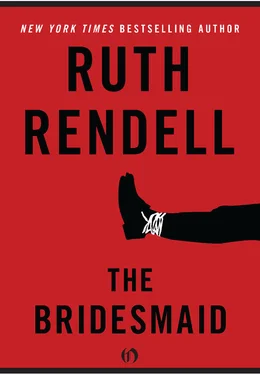Ruth Rendell - The Bridesmaid
Здесь есть возможность читать онлайн «Ruth Rendell - The Bridesmaid» весь текст электронной книги совершенно бесплатно (целиком полную версию без сокращений). В некоторых случаях можно слушать аудио, скачать через торрент в формате fb2 и присутствует краткое содержание. Год выпуска: 2010, Издательство: Open Road Integrated Media LLC, Жанр: Триллер, на английском языке. Описание произведения, (предисловие) а так же отзывы посетителей доступны на портале библиотеки ЛибКат.
- Название:The Bridesmaid
- Автор:
- Издательство:Open Road Integrated Media LLC
- Жанр:
- Год:2010
- ISBN:нет данных
- Рейтинг книги:3 / 5. Голосов: 1
-
Избранное:Добавить в избранное
- Отзывы:
-
Ваша оценка:
- 60
- 1
- 2
- 3
- 4
- 5
The Bridesmaid: краткое содержание, описание и аннотация
Предлагаем к чтению аннотацию, описание, краткое содержание или предисловие (зависит от того, что написал сам автор книги «The Bridesmaid»). Если вы не нашли необходимую информацию о книге — напишите в комментариях, мы постараемся отыскать её.
The Bridesmaid — читать онлайн бесплатно полную книгу (весь текст) целиком
Ниже представлен текст книги, разбитый по страницам. Система сохранения места последней прочитанной страницы, позволяет с удобством читать онлайн бесплатно книгу «The Bridesmaid», без необходимости каждый раз заново искать на чём Вы остановились. Поставьте закладку, и сможете в любой момент перейти на страницу, на которой закончили чтение.
Интервал:
Закладка:
Through one of the panes of clear glass in that window, a lozenge shape in the pretentious coat of arms which formed the design, a woman’s face could be seen, looking out. She wasn’t looking at Philip, who in any case was invisible inside his car. She moved away, and he was about to start the engine when her face reappeared, along with the upper part of her body, at a casement of leaded lights, which she opened.
She wasn’t all that young by his standards, but still he could see she was young. The afternoon sun shone full on her face, which was handsome in a bold, aggressive sort of way, the mass of dark frizzy hair springing back from a broad white brow. She was a good distance from him, but he saw the sun catch and flash fire from a diamond on her left hand, and that told him she was Gerard Arnham’s wife. Arnham had married and this was whom he had married. Anger bubbled up in Philip the way blood bubbles up through a sharp cut in skin. Like that blood flow, he couldn’t immediately control it—there was no cold tap to hold his rage under—and he cursed silently in the closed car.
Philip’s anger made his hands tremble on the wheel. He wished he hadn’t come, he wished he had driven back from Mrs. Ripple’s the way he had come, through Hainault and Barking-side. If things had gone differently, his mother might have been living there, surveying the street from that stained-glass shield, opening that casement to feel the sun.
He couldn’t meet Christine’s eyes. He was uneasy when he was alone with her. Sometimes he could hardly frame the words of some simple routine sentence, something about the dog or had she paid this or that bill. This was the first time he had experienced a mental preoccupation that had become obsessive. In the past there had been his grief at his father’s death. He had worried a bit about exams, then been in suspense while waiting to hear if he was to be offered a place in the Roseberry Lawn training scheme. Another cause for anxiety had been his doubt that permanent employment would follow when his training was complete. But none of those invasions of his equilibrium had overwhelmed his waking thoughts as this knowledge did. It frightened him too because he couldn’t understand what was happening to him.
Why did he care so much that his mother had slept with a man? He knew she had slept with his father. He knew that if she had married Arnham, they would have slept together. Why did he have to think about it so much, torment himself with pictures of the two of them together, repeat in his mind over and over Fee’s words, Fee’s awful revelations? The postcard was still on the living room mantelpiece; he had never carried out his threat of throwing it away, and it was always the first thing he saw when he went into the room. It was as if, instead of a small piece of card with a commonplace photograph on it, it had become a huge picture in violent oils depicting some scene of sadism and sexual depravity, the kind of thing you don’t want to look at but which compels your eyes and stretches them from their sockets.
Somehow their roles had been reversed. He had become her father and she his child. He was the father who wants revenge on his daughter’s seducer or for her seducer to marry her. Pity for her wrenched at him when he looked at her sitting there quietly, stitching away at Cheryl’s bridesmaid’s dress. If she had gone alone to Arnham’s house that day they took Flora, would she be Mrs. Arnham now? Philip couldn’t help thinking that the arrival of all of them on that autumn evening instead of Christine on her own had been a decisive factor in Arnham’s marriage plans. The other woman, the one with the dark hair and the diamond ring, might also have been a candidate at that time, and he had chosen her because she wasn’t accompanied by a bevy of children and a marble statue.
She asked him if he minded her putting the television on. She always asked. He tried to remember if she had done that while his father was alive, and he didn’t think she had. One of the items on the nine o’clock news was a sighting of Rebecca Neave by someone in Spain. it was nearly eight months since her disappearance but reminders of her came into the papers and on television from time to time. A man who sounded responsible and honest claimed to have seen her in her green velvet tracksuit in a resort on the Costa del Sol. It was a place where, according to her parents, Rebecca had twice spent holidays. The man had probably imagined it, Philip thought, or was one of those who will say and do anything to get publicity.
He hadn’t meant to return to Mrs. Ripple’s house, had felt strongly that Chigwell was a corner of the outskirts of London he would be happy never to see again. But in the middle of the week before Fee’s wedding, Roy, who was designing the new bathroom, came up with a problem about the tiling. He needed Mrs. Ripple’s consent to certain changes he proposed in the design, as well as further wall measurements, notably distances between window frames and door architraves and the ends of walls. Philip found himself saying that he could make a very good guess at those measurements and the householder’s consent could be obtained by phone.
“That’s the sort of reply I expect of certain other newly graduated trainees,” said Roy, “but not of you.” His hard dark eyes swam behind the thick glasses he wore. When he wasn’t making cynical, unfunny jokes, Roy talked like a brochure. “It’s thoroughness and attention to the smallest detail which has established Roseberry Lawn’s distinguished reputation.”
Philip realised there was no escape from going to Chigwell, but he told himself that he need not drive along the street where Arnham lived or even, come to that, take a second look at Flora through the binoculars in Mrs. Ripple’s back bedroom. When he left home, Christine’s first client of the day had already arrived, a woman who was having copper-coloured low lights put into her hair. For once Philip was glad his mother wouldn’t be carrying out this project in the bathroom. As it was, he would come home to find the kitchen floor covered with orange splash marks.
“I want to make enough money to pay for Fee’s flowers myself,” Christine whispered as she saw him off at the front door. She pulled on the rubber gloves that were to keep her hands stain-free for Saturday and stuck her thumbnail through the left-hand one.
Customers of Roseberry Lawn often behaved as if visits from employees of the company they had engaged to renovate their homes were a gross intrusion of privacy. Philip had been told of one householder who had taped up the doors on the kitchen he was having converted and obliged the fitters to climb in and out through the window. It was commonplace to be refused the use of lavatory or phone.
Mrs. Ripple, alerted to his coming, though not by him, opened her front door with alacrity. It was as if she had been waiting just inside it. He had scarcely set foot inside the hall when she said to him in a savage tone, “What right do you think you had to use my husband’s field glasses?”
Philip was briefly dumbstruck. Had she tested them for fingerprints? Had some neighbour reported seeing them in his hands?
“Caught you there, haven’t I?” she said. “You thought you’d got away with that one.”
Philip said he was sorry. What else could he say?
“I expect you’re wondering how I found you out.”
This was uttered the reverse of roguishly, Mrs. Ripple’s thick brown eyebrows drawing together like a pair of furry caterpillars meeting, but Philip nevertheless hazarded a smile.
“I place them on that windowsill just so,” she said, “in the corner and with the long side precisely parallel to the wall.” The caterpillars leapt apart and sprang towards her hairline. “I’ve my own reasons for doing that which I shan’t go into. But that’s how I knew. They had been replaced out of alignment.”
Читать дальшеИнтервал:
Закладка:
Похожие книги на «The Bridesmaid»
Представляем Вашему вниманию похожие книги на «The Bridesmaid» списком для выбора. Мы отобрали схожую по названию и смыслу литературу в надежде предоставить читателям больше вариантов отыскать новые, интересные, ещё непрочитанные произведения.
Обсуждение, отзывы о книге «The Bridesmaid» и просто собственные мнения читателей. Оставьте ваши комментарии, напишите, что Вы думаете о произведении, его смысле или главных героях. Укажите что конкретно понравилось, а что нет, и почему Вы так считаете.











